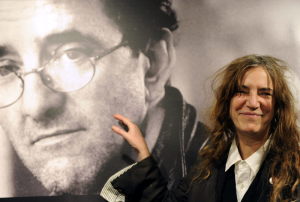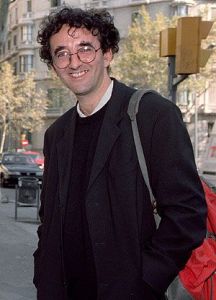“Nothing happened today. And if anything did, I’d rather not talk about it, because I didn’t understand it.”
– Roberto Bolaño, “The Savage Detectives”

I have discovered the work of Chilean poet/novelist/essayist, Roberto Bolaño, in the past year. For years I stayed away from this dude because it seemed like he was probably one of those difficult writers who made a reader’s journey very time consuming and dicey. Boy, was I wrong!
I want to admit here first that I’m mesmerized by what Bolaño produced in his all too short career. I can’t say I’m an addict, but I do love reading pretty much anything he’s ever written. The experience is uncanny. He tends not to overload sentences. Tends not to get too lyrical or philosophical. Most certainly he does not take himself or whatever work he’s doing too seriously (not too seriously does not mean he writes frivolously).
As is often the case here in this blog, I write as someone who has not studied what I am writing about. That means I don’t know what other people think of Bolaño. I don’t know where those sentences come from. I know he’s huge in the literary world. I know I need to do the studying I’m talking about. And I will. But for now, I am happy to simply have my own opinion (for what it’s worth), and to be in awe.
The way Bolaño works is as if he were writing to make sure we understand, and to make sure he isn’t going too far ahead of his reader. It seems like he wanted to be nice to us. That’s pretty rare for any modern author. You can actually feel that when you read him. It’s as if he were saying, “Yes, my friend. It’s not really going to be hard at all to follow me, because, actually, I may be following you…”
There is nothing in the English translations of his work that you can call particularly stylistic. He’s not thunking your feet like Cormac McCarthy does. No trying to make you drunk on bad behavior like Raymond Carver, Barry Hannah and Thomas Pynchon. No painting strange but beautiful scenes with words like Don DeLillo, Annie Dillard, or Alice Munro. No brilliant circus moves and free-form dancing like David Foster Wallace. Maybe there’s a bit of his approach to be found in the miniature genius of Amy Hempel, Lydia Davis, and Diane Williams. It’s hard to know.
One thing I do know, more than ever in my life, is that I wish I could have the first day of 7th grade back at West Junior High School. That was the day I chose the language I would study. Somehow they put me in a random group of students that had supposedly chosen French. This was a ruse we later learned. They already had two Spanish classes for 7th graders and hardly anyone had signed up for French. It was not even a question for me — I was not staying anywhere to learn French. They weren’t completely dictatorial, though. We were given a choice. They would figure out how to squeeze us into Spanish if that’s what we wanted. I don’t know, maybe the group in that room had been chosen because we were more reasonable. Or maybe it was because we are all deemed pathetically malleable and easily swayed. Whatever the case, I raised my hand when they said, “Who wants to try German?”
That choice set me on an eight-year course of German classes where I stumbled around in the dark and came to the conclusion that I did not have a facility with languages. It is true that some of my friendships with other German students would last forever. I am grateful for that. Had I chosen Spanish, though, I would now be able to read Bolaño in his native language (along with many of my other favorite authors). That education begun some 44 years ago would still be coming in handy. My life would have been so different!
(I suppose it’s good that I can partially understand German. Besides the great writers in that language’s history, there is quite a lot of German pornography on the Internet these days, along with other superior artistic films).
At any rate, it seems to me when I’m reading English translations of Bolaño more than anything he’s enjoying sharing his point of view, but he is also quite intent on being nice to his readers — warm, regarding, and, somehow, encouraging. Like this from The Savage Detectives:
“For a while we talked about things I’ve forgotten now. Or maybe we were silent for a while, me sitting at the foot of his bed, him stretched out with his book, the two of us sneaking looks at each other, listening to the sound the elevator made, as if we were in a dark room or lost in the country at night, just listening to the sound of horses.”
There are obvious links to Bolano from Kafka. Everything in his writing always carries with itself the seeds of its own negation. Government and bureaucracy often get twisted up in many of his stories like soiled underwear far too big for the wearer. He also seems extremely close to Henry Miller in his humor and his romantic irreverence for nearly everything. Like Miller, he is quite generous with his vision of the world of culture, especially literary culture. It is hard to find Bolaño ever being extremely critical of another writer. They are often “perhaps the greatest” “one of the wisest” “one of the best read” or some such superlative. He does have it in for others, like Isabel Allende, but somehow he still doesn’t really pierce her skin with his knife. You don’t feel like you’re witnessing snobbishness or hate when he’s got a problem with how someone uses words. It’s really more like he’s just disappointed or even heartsick. Usually, though, with most writers his language is all about starry skies and blue air full of orange sun.
Note: I do so wish I could read those compliments and all that love he has in Spanish. It must be quite a treat.
For the uninitiated, I should just point out that Roberto Bolaño treats authors the way many treat baseball stars or, perhaps, soccer greats. His stories are full of romantic idealist artists (of all kinds it turns out) who go on treks and quests or just sit around dithering about sex and politics and what might have been had this world turned out more courageous. His characters are also often fearless avant-garde nut jobs and world class intellectuals with very little hate or animosity to be found in the cells that make up their bodies. They tend to be heroic radicals that do not much of anything. Perhaps that’s what I like so much about his work in the end — great thinkers able to express intense depth and profound wisdom without ever leaving their typewriters or the class they might be in (or teaching).
That’s not completely true. Travel is also very important to Bolaño. He began his life in Chile, then lived in Mexico for a long time after the 1973 coup in his native country. Finally, he ventured off to Spain. He implies in his work that travel and living a long time in other worlds is essential to the wellbeing of humanity. I can’t argue with that. I have lived a long time in the Midwest, then the Northwest, and, finally, the Eastern Seaboard.
Somehow I find reading Roberto Bolaño’s work an extreme antidote to the idiocy and dicey world we are all stuck with now that media pervades everything, including most of our bodily functions. He’s not afraid to speak the truth. He reminds his reader that writing is like going into battle. By transferrance that means that reading is also like being in a war. You don’t think that, perhaps, but it is. You have to grapple with what the writer has seen and you must decide whether he or she has spoken truth to you. That’s some serious fighting.
“What, then, is writing of quality? Well, what it has always been: knowing to stick one’s head into the dark, knowing to jump into the void, knowing that literature is basically a dangerous occupation. To run along the edge of the precipice: on one side the bottomless abyss and on the other the faces one loves, the smiling faces one loves, and books, and friends, and food. And to accept that fact, though sometimes it may weigh on us more than the flagstone that covers the remains of every dead writer. Literature, as an Andalusian folk song might say, is dangerous.”
– from a 1999 speech known as “The Caracas Speech” accepting the Rómulo Gallegos Prize.
Bolaño makes sure we know that it is not all about a healthy robust existence. It doesn’t ever seem to be far from his mind how sick we all are and how we really want to find a cure — need to find a cure — but that we still also know we must keep on living as we look. That’s important to think about. Writing doesn’t just take us to the edge of the precipice, it lets us explore the abyss and what lies inside of it — worthy writing, anyway … “writing of quality.”
I’ll close with this quote from a book of his essays called The Insufferable Gaucho. This is from the essay “Literature + Illness = Illness.”
“While we are looking for the antidote or the medicine to cure us, that is, the ‘new’, which can only be found by plunging deep into the Unknown, we have to go on exploring sex, books, and travel, although we know that they lead us to the abyss, which, as it happens, is the only place where the antidote can be found.”
Roberto Bolaño died at the age of 50, in July of 2003. I wish I had the time to learn Spanish.


[…] No Translation Possible: On Reading Roberto Bolaño […]